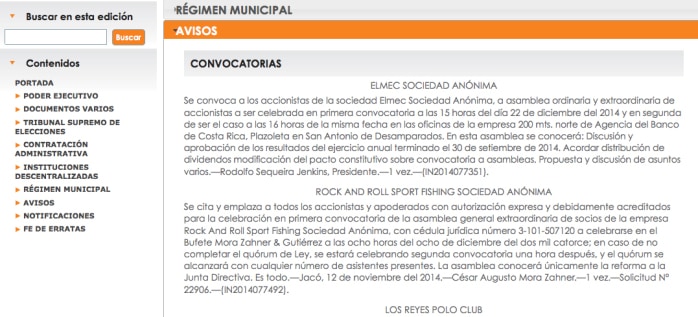Third in a series of columns by Steven Ferris, a Costa Rican attorney with extensive, direct experience in the Costa Rican judicial system, now in private practice. Read his other columns here and here.
In my two previous columns we discussed the basics and some of the details of how to start a company in Costa Rica. Now we’re going to take the topic a step further, describing the responsibilities of the shareholders to make the new company a reality.
As we’ve discussed, there are two seminal steps about which shareholders must be clear: (1) The formal presentation of all the information listed previously in front of a notary public, and (2) the critical period that precedes registering the new company in the Registro Mercantil. This second phase is the subject of today’s column.
Once the articles of corporation have been duly notarized, the notary public will publish the intent to incorporate in the official newspaper La Gaceta. This is followed by presenting the documents to the Registro, along with the payment of the required fees. The issue is what happens before and after these events.
According to the law, before publishing in La Gaceta, the shareholders must act as one in terms of all interaction with third parties when representing the new entity. This must be made clear to all involved; no commercial or contractual activity can be undertaken before the final registration of the company. If any such activity does take place, the individuals involved are personally liable for the consequences.
For this reason, the law allows any partner to register the firm at the Registro, and if successful, he or she is no longer personally and solely responsible for the firm’s activities from that point on.
There are cases wherein a number of individuals agree among themselves to behave as if they were partners in a company, and even give it a name, without having gone through the process of registering a company charter.
In these cases the law considers the organization as a de facto company (sociedad de hecho), and the individuals responsible are not only liable to third parties, but to each other as well, as de facto partners. This kind of organization is clearly not recommended, as there is no official legal recognition, no official legal representative, and no protection of the individual de facto partners.

Related: Want to open a business in Costa Rica? Start with the basics
Once a company (sociedad anónima) is registered with the Registro Mercantil, it is assigned an official corporate identification (persona jurídica), which serves as its legal designation for as long as it exists. This identification typically starts with “3-101-” followed by a unique number. As soon as an identification number is assigned, the company can move ahead and be considered its own entity and engage in any activity associated with its stated objectives.
This is the point at which the entity can request a certificate identifying the persona jurídica from either the Registro Público or any notary public. The certificate states the company name, the identification number, its official address, its original capitalization, date of inception, date of registration, and the names and titles of the partners, including their roles and responsibilities. If a partner’s powers are specifically limited in any way, or his or her powers do not include the ability to represent the company as an individual, the participation of at least one other member of the board of directors will be required.
This certificate is essential to doing business as a company. If, for example, the company is to rent a property in which to conduct its business, in the company’s name, in almost every case a certificate of the persona jurídica must be presented at the time the contract is signed. In addition, it must be no more than 30 days old.
Opening a bank account in the company’s name typically requires the following documents:
- A copy of the company’s official charter, either notarized, or obtained directly from the Registro Público in which case it is automatically notarized.
- The certificate described above.
- Copies of cédulas or passports of the president and any other individual who will access the account. (There is also a relatively new requirement for foreigners called a DIMEX from the Immigration Administration.)
- Two reference letters from banks where the individuals involved have had previous accounts, either locally or overseas.
- Some banks require a copy of a utility bill from the company’s official address.
And there you go! You now have a properly registered company, have rented a place of business, and opened a bank account. You are finally able to go out and make money, legally.
Steven Ferris is a member of the board of directors of The Tico Times’ parent company.
Recommended: Want to start a business in Costa Rica? Let’s look at the details





